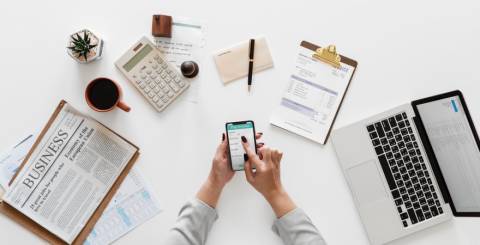Why Your Mobile Payments May Be Insecure?

Mobile devices have become an indispensable part of our daily life. Millions of gadgets are used for browsing, mailing and shopping at every moment all around the world. Many app development companies rival for larger audiences and do their best to provide consumers with convenient and efficient solutions.
Why are we so enthusiastic about mobile payments?
The possibility of using your mobile phone for payments brings a lot of benefits. First, mobile apps with credit and debit cards added significantly simplify and speed up payment transactions. Second, e-wallets today are essential for online purchasing. Third, using smartphones consumers are less likely to run out of money on their debit or credit cards. Nobody likes wasting time, and mobile payments can save time for consumers. In addition, mobile payments are effortless, stress-free, and fast. Mobile transactions have turned into something that is always at hand. Apart from being comfortable, mobile payments are also far more secure.
Statista reports that the amount of mobile payment transactions has doubled compared to the previous year. By 2019, digital transactions are projected to occupy a major part of all the payments and grow further.
Choosing a platform for their gadgets, users consider the settings that are more preferable for them, be it a custom-friendly desktop or the way an app interacts with debit or credit cards. Polls show, however, that quite a few users think about their data security when picking out the application for their mobile payments.
Security concern
With unsophisticated services, how often do security concerns flash across your mind? Traditional security systems and processes, such as firewalls, encryption, and constant AV database updating are not powerful enough to restrain mobile malware. And users themselves may also be inattentive and somehow sabotage the app's work. Let's take a look at the most common security risks that mobile payments are subjected to.
Smartphone loss
It’s like losing a credit card. If a smartphone is not equipped with the latest security features, such as fingerprint verification, it may serve as a guide to the user's personal life, including card numbers and other payment details. So, if a smartphone was stolen or left unattended, its owner may suffer a lot more than just from a device loss.
Malware
Hackers use malware to distantly control mobile devices and computers and get all the valuable information stealing passwords and card numbers. Devices are typically infected with malicious software when users click on the links sent by criminals. So, if the device’s or the app’s security system is vulnerable, hackers will definitely take advantage of the situation.
Cyberthieves
The risk of personal data theft is small, but nevertheless, it exists. When the user adds a card to the mobile wallet, the card number is securely encrypted in the code. Moreover, most mobile payment platforms use random payment tokens to guarantee that all the card data are not available to the third party. But the danger of losing card information grows when the card is added to the mobile wallet via public Wi-Fi networks. Cybercriminals create fake registration systems, and poor users fall into their traps.
Negligence
Negligence is last but not least among risk factors. Users are not always attentive reporting passwords to the third parties. Also, a lot of people tend to use the same password both for social networks and payment platforms. This carelessness jeopardizes mobile transactions.
How to avoid the risks
Surely negligence as a lesser evil does not require tech solutions. As for the rest of the risks, a number of options are available to armor mobile users against malware threat. Here are the most vital methods that help to protect mobile payment systems against external attacks.
First and foremost, download apps from the official app stores only and always make sure that the phone settings don’t allow the installation of unapproved programs. Check that all transactions are safe enough by verifying that card providers have secured their mobile wallets. In order to avoid external intervention, never use public Wi-Fi connections for payments and don’t click on dubious links.
Trust the systems that can block your mobile wallet via ID account pages. In case your smartphone is lost, such a possibility allows erasing the device remotely and thus deleting all the card information. These systems are used on Apple and Samsung smartphones and boast high security and reliability.
More radical ways of protecting mobile payment transactions are the so-called "developers' lifehacks". Creating a secure software keychain inside the application can be the first solution. It enables a higher security level by ensuring that the vital cryptographic key remains inside the app. Another solution is to strengthen the mobile wallet by implementing the code that makes the app self-defending against an external threat.
Conclusion
Mobile devices considerably simplify purchasing, and mobile payment systems have won the hearts and minds of millions of users. Fortunately, there are some workable ways of combating the growing number of risks related to mobile payment technology. Given that those risks may ruin mobile payment experience, users, card providers, and custom mobile app developers should cooperate to be always prepared to protect their virtual wallets.
Similar Articles
Building lending software isn’t just a technical project—it’s a business decision. Whether you're a fintech founder or part of a traditional lending institution trying to go digital, three questions will shape everything that follows
Learn why robust security is crucial for super app development. Explore key strategies and best practices for mobile app development security.
Walkie-talkies with an extensive reception capacity have changed significantly when it comes to portable communication by displaying cutting-edge features with seamless connectivity that covers more than just the state
USB-C technology has revolutionized the way we charge our devices, offering faster charging speeds, higher power delivery, and universal compatibility across multiple devices
Discover expert mobile app development strategies to create a viral app that attracts users and boosts engagement
Optimize app localization for iOS users across the EU with language, cultural, and regulatory adaptations. Engage users and boost retention with these tips!
Discover the top 10 mobile app development trends of 2024! Explore 5G, AI, AR/VR, blockchain, and more to stay ahead in the ever-evolving app development landscape.
With its triple-lens design and fantastic photo and video quality, the iPhone 11 Pro Max is extensively acknowledged for its superior camera system. But problems can occur with also one of the most advanced technologies. If you're having issues with the iPhone 11 pro max camera lens, knowing the typical problems and how to repair them
Protect your app from threats with AppSealing's robust, all-inclusive security solution. Safeguard user data, ensure compliance, and maintain top performance.









